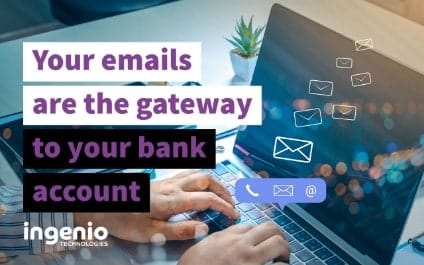Think about just how many emails you send and receive in a day.
Now think about how much information all those emails contain. Confidential information about clients, staff, you, your business, etc. The list is almost endless. The most worrying thing is that your bank details are at risk, as well as clients’ accounts for that matter.
Fake invoices are often sent via email, looking legitimate, and get immediately paid – but the money goes straight into the hands of the cybercriminals, out of your accounts. Even worse, it could be sent to your clients, not only costing them money, but damaging your reputation.
What would a hacker do if they had access to your emails?
Pretend to be you and send Phishing emails
Once a hacker has access to your email account, they can observe what you are doing, pretend to be you and send a Phishing email.
What is a Phishing email?
Phishing is a type of email where a cybercriminal sends a fraudulent message, designed to trick the recipient into revealing sensitive information to the attacker, or to deploy malicious software on the recipient’s infrastructure (like ransomware).
If a hacker is sending emails from your account, it will look legitimate to all receiving it. You could be none the wiser (unless you check your sent box regularly). Once the Phishing email has been sent, it can be very believable for all those who receive it. After all, if one of your friends emailed you, would you question it?
Why you wouldn’t spot a Phishing email
What they will do is send an email out to your clients pretending to be you and will attach an invoice, as you normally would, but they would change the bank detail numbers so they receive the money instead of you. Without the client fully inspecting the invoice bank detail numbers, they would never know. So, not only would this Phishing attack effect you but your clients would get scammed.
If you would like to learn more about Phishing, download our Phishing guide to learn how detrimental it is if your business gets impacted by it – discover what steps you’ll need to take if you click on a Phishing email.
[button text=”Download Phishing guide” target=”_blank” link=”/wp-content/uploads/2021/12/24.-Phishing-emails-How-they-put-your-business-at-risk-and-what-to-do….pdf” type=”primary” size=”large”]
Access online accounts
Nowadays, people often use the same passwords for all accounts. If the hacker already knows your password, it will be incredibly easy for them to log into other accounts that use the same password. Even if you don’t use the same password, the hacker can click the ‘forgot password’ button and use the resulting email – which comes to your email address, which they do have the password for – to change the password, and voilà. Your accounts are their accounts, and they have full access to anything on them that you do.
How secure are your emails?
With all of this in mind, do you have a secure password for your email? If you don’t, I suggest you look into the importance of secure passwords
[button text=”Secure your passwords blog” link=”/2021/10/risks-of-using-the-same-password-and-what-to-do/” type=”primary” size=”large”]
This is the first step to keeping your emails secure, and this also applies to your employees too. Hackers can just as easily break into their emails that use an unsecure password.
Why stop there when so much is at stake?
Your business needs to have more advanced protection to keep it safe and thriving. One small mistake, such as a bad click on a PDF, could plummet your business and finances. In terms of your emails, we encourage you use Email Defender ATP.
This amount of protection will give you so much more security within your emails, meaning you can work without the fear of hackers plundering your accounts, or accessing sensitive data.
Email Defender ATP does all this and more:
- Block advanced threats
- Protect outbound email and stop data leaks
- Tamper-proof email archiving
- Stay connected and productive during downtime
- Automate incident response and get access to threat insights
As an IT support team, we take cybersecurity extremely seriously, and want to make as many businesses aware as we can about the risks they face every day.
If you have any questions about the safety of your email, Email Defender ATP, or cybersecurity in general, then get in touch with us now.
Call 01273 806211
Email hello@ingeniotech.co.uk
.wp-post-image {display: none;}


